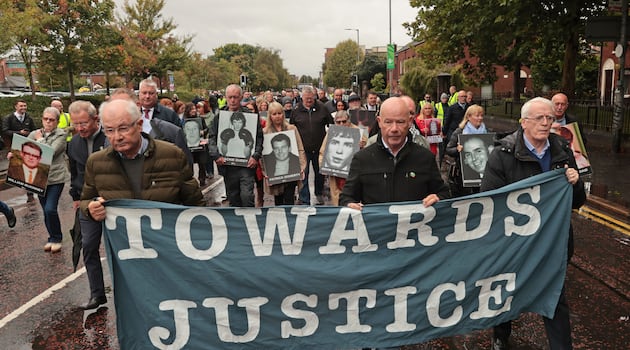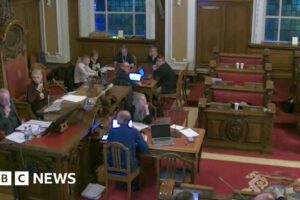
The trial of Soldier F, who is accused of murder and attempted murder on Bloody Sunday, has begun in Belfast.
The former member of the British army’s elite Parachute Regiment is charged with the murders of James Wray and William McKinney and five counts of attempted murder in Derry on January 30th, 1972.
Thirteen people died when soldiers opened fire on anti-internment marchers in the city’s Bogside. A 14th died later.
The 2010 Saville inquiry found the victims were innocent and the killings were “unjustified and unjustifiable”, which led to an apology from the British government.
Soldier F, who cannot be identified due to a court order protecting his anonymity, has pleaded not guilty to the charges.
On Monday morning relatives of the victims and their supporters, carrying pictures of those killed on Bloody Sunday and a banner bearing the words Towards Justice, marched together to Laganside court complex before the opening of the trial.
Speaking outside the court, Mr McKinney’s brother John told reporters it was a “momentous day in our battle to secure justice for our loved ones who were murdered on Bloody Sunday.
“It has taken 53 years to get to this point, and we have battled all the odds to get here.
“We will shortly occupy a courtroom very proudly, with our heads held high and in the knowledge that, regardless of the ultimate outcome, we are on the right side of history.”
[ The Deployment of Art by Clare Carolin: A scathing critique of official British versions of the TroublesOpens in new window ]
He said the Bloody Sunday families would now “place our trust in the hands of the Public Prosecution Service … we hope that they do not let us down”.
Supporters of Soldier F, including a former soldier wearing a Parachute Regiment beret, were also present outside the court.
Northern Ireland’s Veterans Commissioner, David Johnstone, said former soldiers were being demonised and that “for there to be any reconciliation in this province, there must first be a fair and balanced legacy process”.
This must be, he said, “a process that does not facilitate the wholesale demonisation of those who served and certainly not facilitate the rewriting of the history of the Troubles”.
In advance of the opening of the non-jury trial Soldier F was brought into the dock, which was shielded from view by a black curtain.
Opening the case for the prosecution, Louis Mably KC said that, on Bloody Sunday, the defendant was “part of a small group of soldiers” who moved into a residential courtyard at Glenfada Park.
[ Forensic advances bring chance of new prosecutions for Guildford and other 1970s IRA bombingsOpens in new window ]
Soldiers “opened fire with their self-loading rifles, shooting at the civilians as they ran away, and the result was … two deaths and four men wounded”.
He said the prosecution’s case was “that the shooting was unjustified, the civilians in the courtyard did not pose a threat to the soldiers and nor could the soldiers have believed that they did”.
The civilians were “unarmed, they were simply shot as they ran away … the shooting was unnecessary and it was gratuitous”, the barrister said.
“It was carried out, given the weapon involved, with an intent to kill” or cause serious harm.
Afterwards, Mr Mably said, the consequences were “dire” and “could not be disguised, because in the courtyard were the bodies of young men lying on the ground”.
Soldiers subsequently gave “false accounts” of what had happened, but Soldier F’s colleagues admitted the defendant had opened fire.
They sought to justify the shooting by claiming the victims had been armed, “an attempt to justify and confuse but … demonstrably false”, Mr Mably said.
But the significance of these statements, he emphasised, was that “they did identify the defendant as one of the people who would open fire at the material time”.
The trial continues.
Additional reporting – PA.





